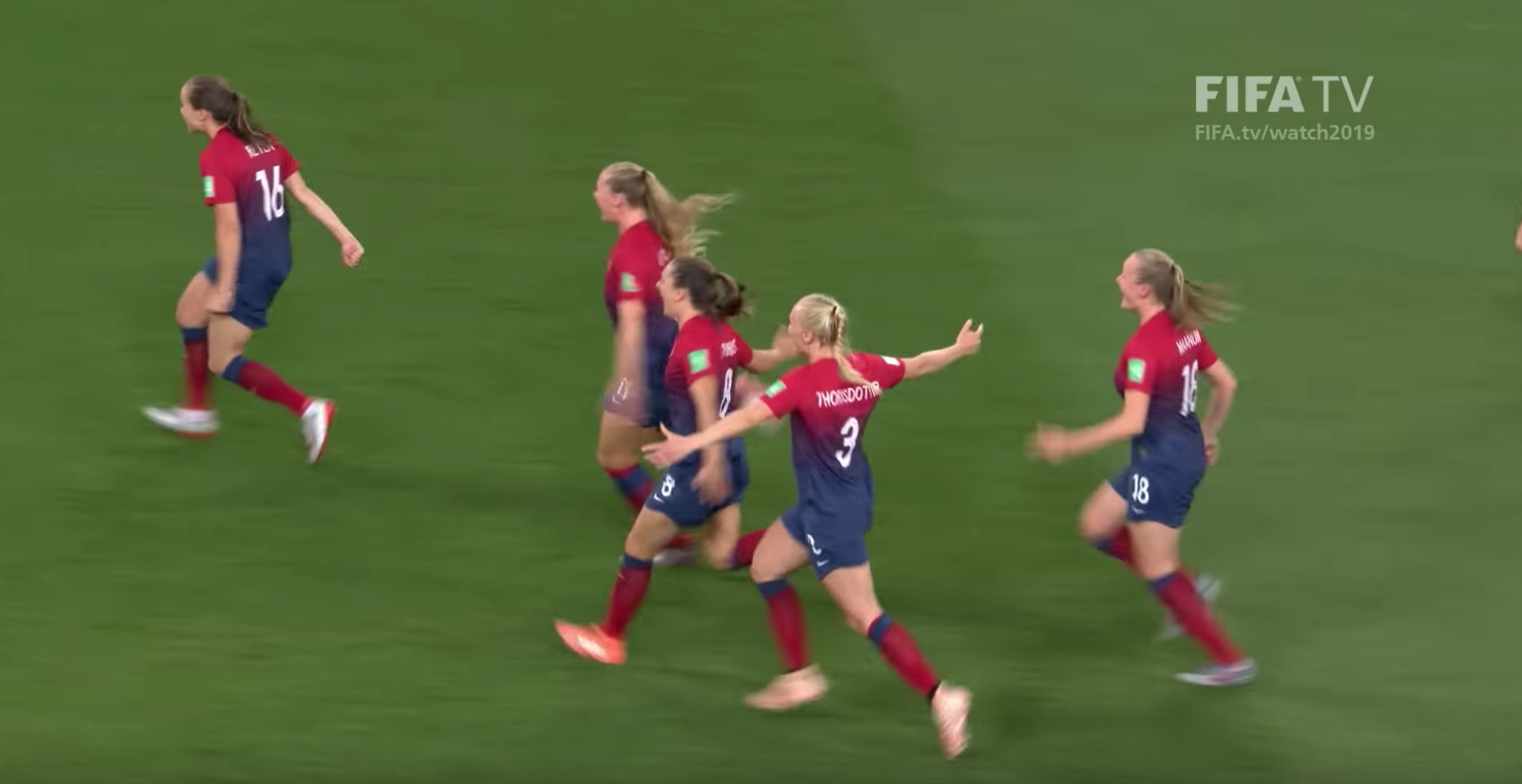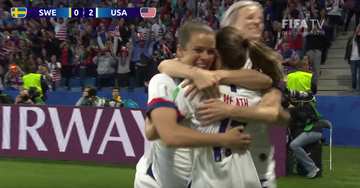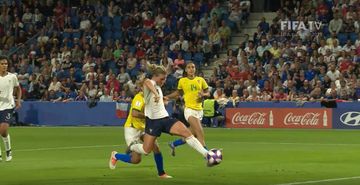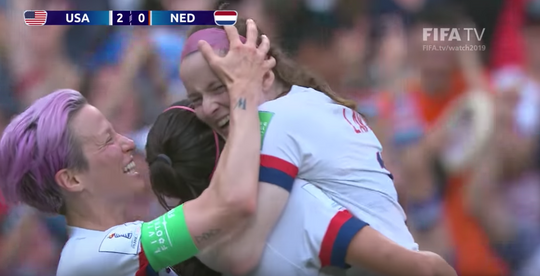Germany 3-0 Nigeria
So far, the story for Die Nationalelf has been the absence of its pre-tournament hype talisman, Dszenifer Maroszán, who’s been out with a broken toe. But with four wins now in the tournament, Germany hasn't been hurting too badly without her. Germany out-possessed and outshot the Super Falcons, who struggled with injuries and suspensions for key players like Asisat Oshoala and Rita Chikwelu. Lea Schüller continued to step up for Germany, capitalizing on a giveaway for the decisive late goal. But the match was overshadowed by the coverage of the American broadcasters' commentary, which was, to put it charitably, a mess.
What We Learned:
- Pace & Power & Let's All Do Better: It's always important to talk about racism, sexism and the areas in which the two unfortunately converge, and it's impossible to divorce yesterday's match from its commentary. There have been plenty of bad examples of commentators resorting to stereotyping in this tournament (notably "China is disciplined; South Africa is physical" during their clash, which was particularly egregious when LITERALLY THE OPPOSITE is true about both sides).
But the American broadcast of the Germany-Nigeria match, featuring commentary by Lisa Byington and Cat Whitehill, was a new level of shocking. In addition to literal "pace and power" tropes being invoked, the commentators inferred that the Super Falcons had made it to the tournament on athleticism alone and needed a European coach to teach them tactics and discipline.
Whitehill in particular got dragged on social media, and rightfully so, and the conversation included commentary on this kind of stereotyping Grant Wahl and this, from Rose Eveleth, a "how bad announcers talk about Black players and African teams bingo" from the 2018 men's World Cup, has resurfaced. At any rate, it’s a stark reminder to all of us, fans and broadcasters and sports bloggers (NB: this applies also to the author of this post, who is a white lady from the United States), that we owe it to the players and the sport to do better. Commentating on sports is hard, and often hampered by a limited vocabulary, but that's no excuse for racism, sexism or misogynoir. "Do better" is often a broad and pleading phrase that could mean all kinds of things, but educating ourselves on non-North American and European sides and being thoughtful with our word choices and thinking about why we've gone to those word choices first. It'll make us better fans, better writers and commentators, and generally less awful.
And if your own soccer Twitter and media diet leans heavily into white and American or Euro-centric territory, now is a very good time to expand that. Some good people to start with, if you're not following their work already: Ann Odong, Oluwashina Okeleji, Juliet Bawuah, Colin Udoh, Miriti Murungi and Shireen Ahmed. - The Fight For Better Pay Must Be Discussed Globally: We've heard a ton about the fight for equal/better pay for female footballers in this tournament, from Ada Hegerberg's protest to the USWNT's lawsuit. After their tournament exit, the Super Falcons staged a sit-in protest, refusing to exit their hotel until the Nigerian FA pays out their outstanding bonuses from two matches prior to the World Cup. This is the second time in recent years Nigerian players have held this kind of demonstration, the first after winning the Africa Cup in 2016. Had it not been for Colin Udoh's reporting, this story may have flown under the radar for a lot of footy-watching audiences, but it's essential that when we talk about advocating for players to be compensated for what they are worth, we're talking about everyone, not just the USWNT.
Standout Performances:
- Alexandra Popp: The day was all about the Nationalelf’s skipper, who earned her 100th cap and opened the scoring with a powerful blink-and-you-miss-it header.
- Rasheedat Ajibade: After a long while where nothing really happened, the super-sub, who last played for FC Robo in Lagos, injected some excitement and creativity into the match with a breakaway, trying to reach Desire Oparanozie and an open German goal, but it couldn’t quite connect.
Stray Observations:
- "Are you done talking?" Bless Franny Ordega and Sam Kerr for giving us the kiss-offs this tournament needed.
- Yesterday began with yet another rule change. What a mess.
- The commentators also spent an awful lot of time talking about the USWNT during this match, which, like, it's for an American audience and we all love Tobin Heath, but we don't have to do this right now.
What's Next?:
Man, this one hurts. The Super Falcons were a joy in this tournament, from Onome Ebi's veteran presence to Francesca Ordega’' legendary everything to the satisfying connecting moves that led to this sublime Asisat Oshoala goal. They will be back and next time we will give them the words they deserve. Also, please pay them, Nigerian FA.
Germany will play the winner of Monday's Canada/Sweden matchup on Saturday, and if today is any indication, we should expect to see them in the semifinals.
Highlights: https://youtu.be/k3BjAtHGwF8
Norway 4-1 Australia (Penalties)
How's everyone doing? Good? Anyone need anything? A hug? A nap? Bourbon? Probably bourbon. Diehards watched this game like nerds watched the good seasons of Game of Thrones, eyes half covered, edge of seat, white-knuckled and waiting for some horrible twist or for our favorite characters to be taken out.
Norway's tenacious attack struck first with a stunner from Isabell Herlovsen, and after plenty of drama, including a Sam Kerr strike that got waved off for offside, Elise Kellond-Knight equalized in the dying minutes of the match, because of course this match was destined to go into extra time and give everyone even more anxiety. Alanna Kennedy was sent off in extra time on a shout-at-your-TV-worthy call, and in the end, the Matildas made their exit in a heartbreaking fashion on penalties. Today we are reminded that in one soccer match, we can experience, as Homer Simpson says, "the dizzying highs, the crushing lows, the creamy middles."
What We Learned:
- Chaos Catches Up to the Matildas: You can have all the Sam Kerrs in the world, but the chaos on and off the pitch leading up to the tournament for the Matildas caught up with them. An abrupt coaching change and organizational shakeups put the side at a disadvantage going in, and the evidence of the learning curve Ante Milicic was dealing with was still there. The backline looked disorganized, confusing substitutions were made, and everyone deserved a better finale than this.
- What We Talk About When We Talk About Kerr: A not-so-good day for Sam Kerr is still better than most, and she demonstrated her ability to find space and make jaw-dropping shots. She had a beautiful goal disallowed for offside (and so, VAR comes for us all) and missed a penalty in the shootout. But the conversation was on her before the match even started with rumors that she is headed to Chelsea on a million-dollar contract.
Kerr has denied the rumors, stating she's happy with her current club (and, taking off my writer hat for a moment, this Red Stars fan is happy to hear that), but here's hoping that even a whiff of this rumor will light a fire under the domestic leagues and owners across the world. If a European club is (allegedly) willing to pay a premium for a player like Kerr, one larger than most NWSL payrolls, then that should send a message to other clubs and leagues that they will have to improve wages across the board to stay competitive. Based on experience with Major League Soccer and the DP rule, I know that it doesn't always work like that (just ask Robbie Keane's old teammates), and collective bargaining and supporter pressure will play a role here too, but there is some semblance of hope that more clubs will invest more and better in WoSo talent.
Standout Performances:
- Caroline Graham Hansen: Caroline Graham Hansen is making a case once again for being named among the players of the tournament. She had Lydia Williams and Australia's back line sweating the whole match, dominating the first half with a number of well-taken chances. Her combination of threatening speed and spatial awareness made for most of Norway’s best offensive moves today.
- Lydia Williams: Norway struck first, and in the end, Williams couldn’t save the onslaught of well-taken penalties, but Williams still had a great game. Where the Matildas' backline came up short, Williams had them covered, staving off crafty and tenacious shots from Graham Hansen and Vilde Risa.
Stray Observations:
- Get yourself someone who supports you the way Yuki Nagasato supports Sam Kerr. This is also your casual reminder that the NWSL is still happening!
What's Next?:
Australia fought hard, but their World Cup journey ends here. Norway will face the winner of Sunday's clash between England and Cameroon on Thursday (UPDATE: thanks to the world's worst game, it's going to be England), setting up a pretty fun and interesting semifinal regardless of their opponent. The teams are dwindling and it's getting harder to say goodbye!
Highlights: https://youtu.be/aJhddaT2JQA






